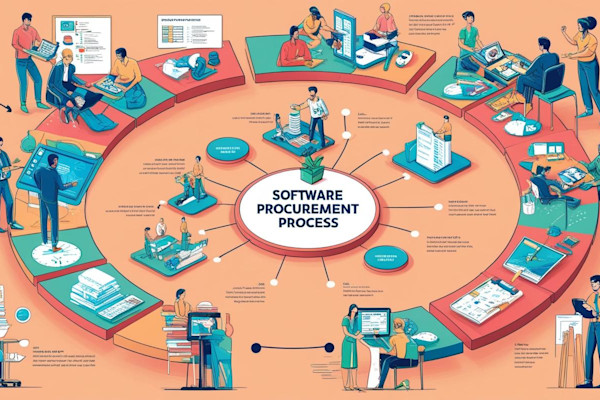
Finance & Accounting Software
Published on: February 14, 2025
Overview
Definition
Finance and accounting software solutions help businesses manage financial transactions, budgeting, compliance, and reporting. These tools automate bookkeeping, tax calculations, expense tracking, and payroll to ensure accurate financial management.
Who Uses It?
Small Businesses & Startups – Managing invoices, expenses, and payroll.
Enterprises – Automating financial workflows, compliance tracking, and forecasting.
Accounting Firms – Streamlining client financials and tax compliance.
Nonprofits & Government Organizations – Ensuring transparency and grant reporting.
E-commerce Businesses – Tracking transactions, tax, and multi-currency payments.
Why It Matters
Enhances Financial Accuracy – Reduces manual errors in accounting.
Improves Compliance – Ensures adherence to tax regulations and financial laws.
Saves Time & Costs – Automates invoicing, payroll, and reporting.
Facilitates Strategic Decision-Making – Provides real-time insights and forecasting tools.
2. Key Features to Consider
Must-Have Features
General Ledger & Financial Reporting – Core accounting functionalities for tracking transactions.
Accounts Payable & Receivable – Automates invoicing, billing, and vendor payments.
Payroll Management – Tax compliance, direct deposits, and employee compensation tracking.
Expense & Budget Management – Tracks expenditures and provides financial planning tools.
Tax Management – Ensures accurate tax calculations and reporting.
Advanced Features
AI-Powered Financial Insights – Automated analytics for forecasting and financial planning.
Multi-Currency & International Support – Handles exchange rates and cross-border transactions.
Fraud Detection & Security – AI-driven anomaly detection and compliance auditing.
ERP Integration – Connects with enterprise resource planning systems.
Automated Bank Reconciliation – Syncs bank transactions for seamless bookkeeping.
Customization & Integrations
Industry-Specific Solutions – Tailored features for retail, healthcare, and nonprofits.
API & Third-Party Integrations – Connectivity with CRMs, payroll, and tax services.
Scalability – Adapts to businesses from startups to large enterprises.
3. Types of Finance & Accounting Software and Top Solutions
3.1 Accounting & Bookkeeping Software
| Software | Key Features | G2 Score | Capterra Score | SoftwareAdvice Score | TrustRadius Score | Average Score | Pricing | Website |
|---|---|---|---|---|---|---|---|---|
QuickBooks Online | Cloud-based, invoicing, reporting | 4.7 | 4.6 | 4.5 | 4.6 | 4.6 | Starts at $25/month | |
Xero | Multi-currency, bank reconciliation | 4.6 | 4.5 | 4.4 | 4.5 | 4.5 | Starts at $12/month | |
FreshBooks | Automated invoicing, time tracking | 4.5 | 4.4 | 4.3 | 4.4 | 4.4 | Starts at $15/month | |
Wave Accounting | Free accounting, receipt scanning | 4.4 | 4.3 | 4.2 | 4.3 | 4.3 | Free & Paid Plans | |
Zoho Books | Tax compliance, client portal, automation | 4.3 | 4.2 | 4.1 | 4.3 | 4.3 | Starts at $10/month |
3.2 Payroll Software
| Software | Key Features | G2 Score | Capterra Score | SoftwareAdvice Score | TrustRadius Score | Average Score | Pricing | Website |
|---|---|---|---|---|---|---|---|---|
Gusto | Automated payroll, benefits integration, tax filing | 4.7 | 4.6 | 4.5 | 4.6 | 4.6 | Starts at $40/month | |
ADP Workforce Now | HR and payroll management, compliance tracking | 4.6 | 4.5 | 4.4 | 4.5 | 4.5 | Custom | |
Paychex Flex | Payroll, tax services, employee benefits | 4.5 | 4.4 | 4.3 | 4.4 | 4.4 | Starts at $39/month | |
Rippling | Unified payroll, HR, and IT management | 4.4 | 4.3 | 4.2 | 4.3 | 4.3 | Starts at $8/user/month | |
Paycor | Cloud-based payroll and workforce management | 4.3 | 4.2 | 4.1 | 4.3 | 4.3 | Custom |
3.3 Expense Management Software
| Software | Key Features | G2 Score | Capterra Score | SoftwareAdvice Score | TrustRadius Score | Average Score | Pricing | Website |
|---|---|---|---|---|---|---|---|---|
Expensify | Receipt scanning, expense automation, corporate cards | 4.7 | 4.6 | 4.5 | 4.6 | 4.6 | Starts at $5/user/month | |
Concur Expense | Enterprise expense tracking, compliance automation | 4.6 | 4.5 | 4.4 | 4.5 | 4.5 | Custom | |
Zoho Expense | AI-powered expense reporting, mileage tracking | 4.5 | 4.4 | 4.3 | 4.4 | 4.4 | Starts at $5/user/month | Visit Site |
Rydoo | Mobile-first expense tracking, real-time approvals | 4.4 | 4.3 | 4.2 | 4.3 | 4.3 | Custom | |
Emburse Certify | AI-driven expense auditing, policy enforcement | 4.3 | 4.2 | 4.1 | 4.3 | 4.3 | Custom |
3.4 Financial Planning & Analysis (FP&A) Software
| Software | Key Features | G2 Score | Capterra Score | SoftwareAdvice Score | TrustRadius Score | Average Score | Pricing | Website |
|---|---|---|---|---|---|---|---|---|
Adaptive Insights | Budgeting, forecasting, scenario planning | 4.7 | 4.6 | 4.5 | 4.6 | 4.6 | Custom | |
Anaplan | Enterprise financial modeling, workforce planning | 4.6 | 4.5 | 4.4 | 4.5 | 4.5 | Custom | |
Planful | Automated financial planning, AI-driven insights | 4.5 | 4.4 | 4.3 | 4.4 | 4.4 | Custom | |
Board | Integrated business intelligence and financial planning | 4.4 | 4.3 | 4.2 | 4.3 | 4.3 | Custom | |
Jedox | Excel-like FP&A platform, real-time forecasting | 4.3 | 4.2 | 4.1 | 4.3 | 4.3 | Custom |
3.5 Enterprise Financial Management Solutions
| Software | Key Features | G2 Score | Capterra Score | SoftwareAdvice Score | TrustRadius Score | Average Score | Pricing | Website |
|---|---|---|---|---|---|---|---|---|
Oracle NetSuite | Cloud-based ERP, multi-entity financials | 4.7 | 4.6 | 4.5 | 4.6 | 4.6 | Custom | |
SAP S/4HANA Finance | AI-driven financial automation, compliance tools | 4.6 | 4.5 | 4.4 | 4.5 | 4.5 | Custom | |
Microsoft Dynamics 365 Finance | Global financial management, AI-powered insights | 4.5 | 4.4 | 4.3 | 4.4 | 4.4 | Custom | |
Sage Intacct | Scalable financial management, multi-entity support | 4.4 | 4.3 | 4.2 | 4.3 | 4.3 | Custom | |
Workday Financial Management | Cloud ERP, real-time analytics, risk management | 4.3 | 4.2 | 4.1 | 4.3 | 4.3 | Custom |
4. Pricing Models & Cost Considerations
Common Pricing Structures
Subscription-Based Pricing – Monthly or annual plans per user or business size.
One-Time Licensing Fees – Upfront costs for perpetual software use.
Usage-Based Pricing – Fees based on transaction volumes or features used.
Enterprise Custom Pricing – Negotiable plans for large organizations.
Hidden Costs
Implementation & Training Fees – Setup and onboarding costs.
Compliance & Security Costs – Fraud detection and auditing expenses.
Banking & Payment Fees – Charges for processing transactions and bank syncs.
Third-Party Integration Fees – Additional costs for add-ons and API usage.
Negotiation Tips
Ask for Scaled Pricing – Many vendors offer discounts for annual plans.
Request Custom Quotes – Tailored pricing for industry-specific needs.
Evaluate Free Trials – Test usability before committing.
Check for Bundled Services – Vendors may offer discounts for multiple features.
5. How to Choose the Right Finance & Accounting Software
Step-by-Step Buyer’s Checklist
✅ Define accounting and financial management requirements. ✅ Compare pricing structures and scalability options. ✅ Evaluate compliance and security features. ✅ Assess integration with payroll, banking, and ERP systems. ✅ Request demos and free trials. ✅ Consider long-term financial planning capabilities.
Common Mistakes to Avoid
Ignoring Compliance & Security – Ensure adherence to financial regulations.
Choosing Cost Over Functionality – Prioritize must-have features over budget savings.
Skipping Integration Testing – Ensure compatibility with existing financial tools.
Not Considering Growth Needs – Choose software that scales with your business.
Decision Matrix Template
| Factor | Weight | Option 1 | Option 2 | Option 3 |
|---|---|---|---|---|
Features & Functionality | X% | Score | Score | Score |
Pricing & Total Cost | X% | Score | Score | Score |
Integration Capabilities | X% | Score | Score | Score |
Compliance & Security | X% | Score | Score | Score |
Total Score | 100% | Score | Score | Score |
6. Implementation & Adoption Tips
Best Practices for Rolling Out Finance & Accounting Software
Conduct a Pilot Test – Validate usability before full deployment.
Ensure Compliance Setup – Align financial tracking with tax regulations.
Train Finance Teams – Provide access to learning resources.
Monitor Performance – Regularly review accounting reports and audits.
How to Get Team Buy-In
Showcase Efficiency Gains – Highlight time savings and automation benefits.
Address Security Concerns – Emphasize fraud detection and compliance features.
Provide Hands-On Training – Encourage adoption through interactive workshops.
7. Conclusion & Next Steps
Selecting the right finance and accounting software is crucial for streamlining financial operations, ensuring compliance, and making data-driven business decisions. By assessing business needs and comparing top solutions, organizations can optimize financial management and enhance profitability.
For personalized finance software recommendations and consultations, contact us at connect@allcaps.ai.


